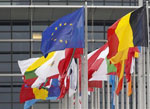 Reuters: European Union governments imposed sanctions on Tuesday against major Iranian state companies in the oil and gas industry, and strengthened restrictions on the central bank, cranking up financial pressure over Tehran’s nuclear program. By Justyna Pawlak
Reuters: European Union governments imposed sanctions on Tuesday against major Iranian state companies in the oil and gas industry, and strengthened restrictions on the central bank, cranking up financial pressure over Tehran’s nuclear program. By Justyna Pawlak
 BRUSSELS (Reuters) – European Union governments imposed sanctions on Tuesday against major Iranian state companies in the oil and gas industry, and strengthened restrictions on the central bank, cranking up financial pressure over Tehran’s nuclear program.
BRUSSELS (Reuters) – European Union governments imposed sanctions on Tuesday against major Iranian state companies in the oil and gas industry, and strengthened restrictions on the central bank, cranking up financial pressure over Tehran’s nuclear program.
More than 30 firms and institutions were listed in the EU’s Official Journal as targets for asset freezes in the EU, including the National Iranian Oil Company (NIOC), a large crude exporter, and the National Iranian Tanker Company (NITC).
Both are vital to the Iranian oil industry, the main source of revenue for the government.
Their importance has risen in recent months as the European Union and the United States seek to reduce Tehran’s access to cash by forcing Western companies to halt trade with the OPEC producer. Tuesday’s decision complements previous moves by the EU, such as this year’s embargo on Iranian oil imports to Europe and a decision on Monday to ban gas purchases.
“We are now comprehensively capturing all possible elements of this sector and sources of funding for the regime,” a senior EU official said.
Western governments fear Iran wants the ability to build an atomic bomb. Iran denies having any military intentions.
Iran said the sanctions would not work.
“We recommend that, instead of taking the wrong approach and being stubborn and using pressure, … with a logical approach they can return to discussions,” foreign ministry spokesman Ramin Mehmanparast told a news conference.
The United States imposed restrictions on NIOC last month and has blacklisted the tanker company.
Justifying the decision, EU governments said that both NIOC and NITC provide financial support to Iran’s government.
A senior NITC official said this EU argument was “baseless”, adding the group was privatized in 2000 and was owned by three pension funds. In addition, he said, the poor state of the tanker market meant the company did not have money to spare.
“It is nonsense and it does not add up,” the NITC official told Reuters from Tehran. “Our shareholders have control of the company. There is no government interference and there is no connection.”
One expert in Washington said both NITC and NIOC served Tehran as fronts for nuclear procurement abroad.
“To shield NITC from sanctions, the Iranian regime concocted a fictitious privatization scheme in the early 2000s,” said Emanuele Ottolenghi of the Washington-based Foundation for the Defense of Democracies, which has advised the U.S. government and lawmakers on sanctions. “But in truth, NITC was always a tool in the hands of the regime.”
FRESH IRAN TALKS SEEN
The new listings follow a decision on Monday by the 27 EU governments to bring sweeping new sanctions against Iranian banking and energy sectors to try to draw Tehran into serious negotiations about its atom project.
A spokesman for EU foreign policy chief Catherine Ashton said six powers negotiating with Iran were hoping to resume talks soon but that no more meetings had yet been scheduled.
“We focus our sanctions on those who are responsible for the (Iranian) nuclear program, while at the same being open to talks,” Michael Mann told a regular news briefing in Brussels.
Iran denies its work has any military intentions and says it will not scale back activities unless sanctions are lifted.
But Europe and the United States are increasing sanctions pressure amid fears of an Israeli attack on Tehran’s nuclear facilities, which could lead to a new war in the Middle East.
In Tuesday’s list, the European Union also targeted NIOC subsidiaries, such as Naftiran Intertrade Company, as well as the National Iranian Gas Company and National Iranian Oil Refining and Distribution. Several banks were also listed.
Naftiran owns a 10 percent stake in the Shah Deniz project in Azerbaijan which is co-led by BP and Norway’s Statoil and which is estimated to contain 1.2 trillion cubic meters of gas. The senior EU official said sanctions were structured to protect the Azeri project from financial impact.
Neither the United States nor Europe import Iranian oil, and both are trying to curb Iran’s sales elsewhere.
(Additional reporting by Jonathan Saul in London; editing by David Cowell and James Jukwey)


